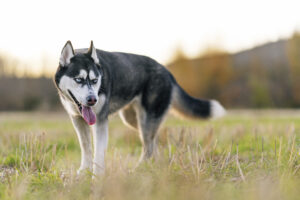Introduction
Have you recently noticed your dog suddenly eating grass like crazy? This behavior can be concerning for many pet owners, especially when it happens out of nowhere. While occasional grass consumption is normal for dogs, frantic or excessive grass eating might indicate underlying issues that shouldn’t be dismissed.
As a responsible pet parent, it’s essential to understand why your furry friend might suddenly develop this habit. Your dog eating grass frantically could be trying to communicate something important about their health or emotional state.
In this comprehensive guide, we’ll explore the potential reasons behind this behavior, when it becomes concerning, and what actions you should take if your dog suddenly eating grass like crazy has you worried.
Is It Normal for Dogs to Eat Grass?

Before diving into concerning reasons, let’s address a common question: is it normal for dogs to eat grass? The answer is yes—to an extent.
Occasional grass nibbling is actually quite common in the canine world. Many veterinarians consider moderate grass eating to be a normal dog behavior with roots in their ancestral diet. Wild canids often consume plant material either directly or through the stomach contents of their prey.
However, there’s a significant difference between casual grazing and when your dog eating grass like crazy all of a sudden becomes a new pattern. The key factors to consider include:
- The suddenness of the behavior
- The intensity (frantic vs. casual)
- Any accompanying symptoms
- Changes in your dog’s overall behavior
When your dog shifts from occasional nibbling to dog eating grass excessively, it’s time to pay attention to what might be triggering this change.
5 Alarming Reasons Your Dog Suddenly Eating Grass Like Crazy
1. Gastrointestinal Distress and Self-Medication
One of the most common reasons for a dog eating grass and vomiting is gastrointestinal discomfort. This behavior might be an instinctive attempt at self-medication. When your dog is experiencing stomach upset, the texture of grass can induce vomiting, which might help them expel whatever is causing their discomfort.
Signs that your dog eating grass frantically might be due to digestive issues include:
- Repeated swallowing or licking of lips
- Dog eating grass and gagging
- Increased stomach noises
- Restlessness or inability to get comfortable
- Dog eating grass and throwing up shortly after
Dr. Michael Petty, DVM, explains: “When a dog suddenly starts consuming grass frantically, they may be trying to induce vomiting to relieve nausea or discomfort. This natural behavior helps them expel something irritating their digestive system.”
If your dog eats grass when sick, they might be instinctively trying to help themselves feel better. However, persistent gastrointestinal issues require proper veterinary attention, as they could indicate more serious conditions like:
- Food allergies or sensitivities
- Inflammatory bowel disease
- Gastritis
- Intestinal parasites
- Pancreatitis
- Foreign body ingestion
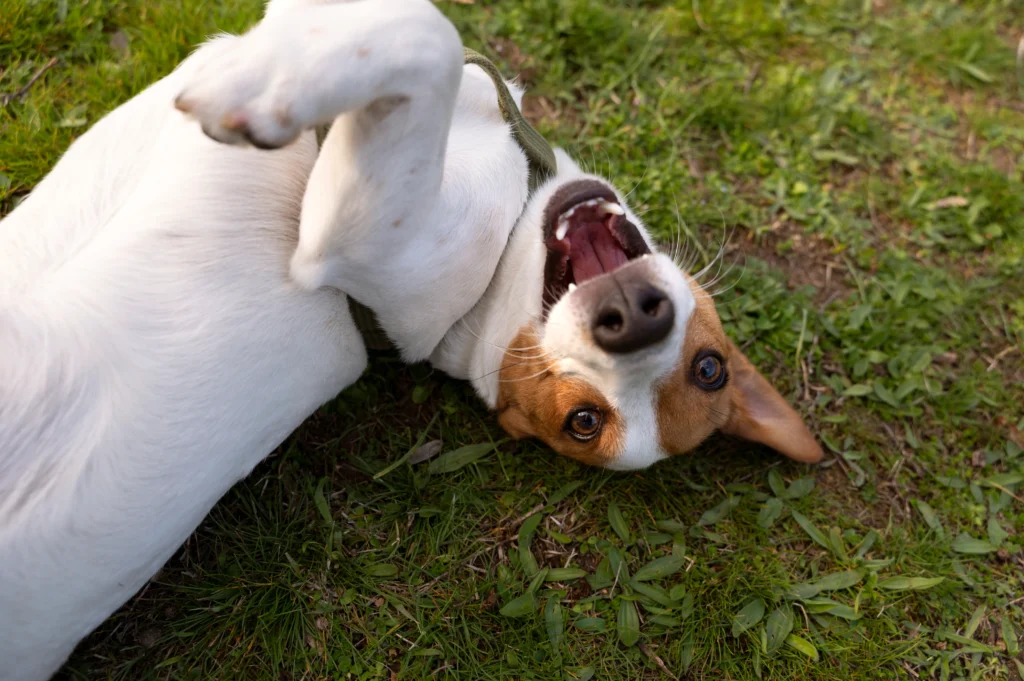
2. Nutritional Deficiencies
When your dog eating grass obsessive behavior develops suddenly, it could potentially signal nutritional deficiencies in their diet. Dogs are primarily carnivores but do require some plant matter and fiber in their diets.
A dog eating grass and not eating food might be attempting to supplement something missing from their regular meals. This could include:
- Fiber deficiency
- Vitamin or mineral imbalances
- Inadequate quality protein
- Overall caloric insufficiency
Dr. Jennifer Coates, veterinary consultant, notes: “A sudden increase in grass consumption, especially when accompanied by decreased interest in regular food, might indicate your dog is instinctively seeking nutrients they’re not getting from their diet.”
Consider reviewing your dog’s current diet and consult with your veterinarian about potential improvements or supplements if you notice dog eating grass excessively along with changes in appetite.
3. Psychological Factors: Anxiety and Boredom
Mental health plays a significant role in unusual canine behaviors, including when your dog suddenly eating grass like crazy becomes routine. This behavior can sometimes stem from:
- Dog eating grass anxiety: Stress or anxiety can trigger compulsive behaviors in dogs, including excessive grass consumption
- Boredom or lack of mental stimulation
- Attention-seeking behavior
- Compulsive disorders
Dr. Karen Overall, veterinary behaviorist, explains: “Compulsive grass eating can develop as a coping mechanism for dogs experiencing chronic stress, separation anxiety, or insufficient mental and physical stimulation.”
Signs that your dog eating grass and acting weird might be due to psychological factors include:
- Other anxious behaviors (pacing, excessive licking, destructive behavior)
- Dog eating grass and restless behavior
- The behavior intensifies during stressful situations
- Dog grass eating behavior improves with increased exercise and mental stimulation
4. Intestinal Parasites and Infections
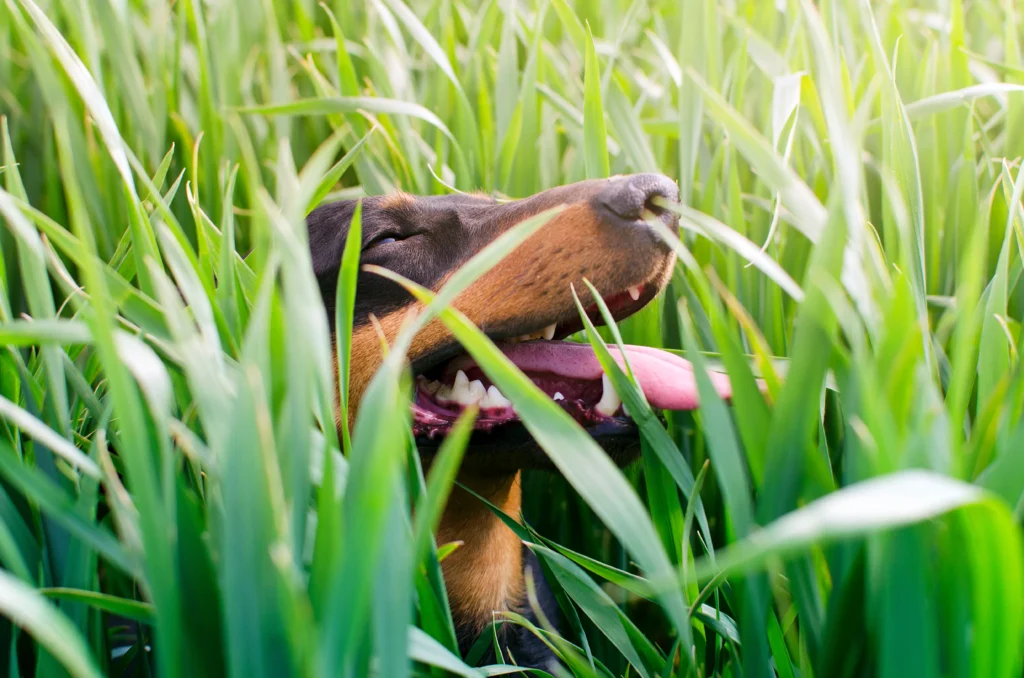
A concerning reason for why is my dog eating grass suddenly could be intestinal parasites or infections. These unwelcome guests can cause significant discomfort, leading your dog to eat grass as a way to soothe their digestive tract or induce vomiting.
Common parasites that might trigger a dog eating grass frantically include:
- Roundworms
- Hookworms
- Whipworms
- Giardia
- Coccidia
Signs that parasites might be behind your dog eating grass and diarrhea include:
- Visible worms in stool or vomit
- Bloated appearance
- Weight loss despite normal or increased appetite
- Dog eating grass and throwing up with increasing frequency
- Lethargy or reduced energy levels
Regular deworming and parasite prevention are essential aspects of pet care. If you notice your dog suddenly eating grass like crazy along with any of these symptoms, a veterinary visit for fecal testing is advisable.
5. Underlying Medical Conditions
Perhaps the most alarming reason for a sudden change in dog behavior eating grass is an underlying medical condition. Various health issues can manifest through changes in eating habits, including excessive grass consumption.
Serious conditions that might cause your dog eating grass like crazy all of a sudden include:
- Inflammatory bowel disease
- Gastric reflux
- Pancreatitis
- Liver disease
- Gallbladder issues
- Certain types of cancer
Dr. Jerry Klein, Chief Veterinary Officer for the American Kennel Club, warns: “When grass eating becomes obsessive and is accompanied by other symptoms like weight loss, lethargy, or changes in bathroom habits, it warrants immediate veterinary attention as it could indicate serious underlying health conditions.”
When Should I Worry If My Dog Eats Grass?
Understanding when casual grazing crosses into concerning territory is crucial for every pet owner. Here are specific scenarios when you should be concerned about your dog eating grass frantically:
Sudden Onset
If your dog has never shown interest in grass before and suddenly starts eating grass obsessively, this abrupt change warrants attention. A new behavior that develops rapidly often signals something has changed with your pet’s health or environment.
Excessive Consumption
While occasional grass nibbling is normal, dog eating grass excessively to the point where it seems like their primary focus during outdoor time is concerning. This intensity suggests something beyond normal exploration or dietary supplementation.
Accompanying Symptoms
Be particularly vigilant if your dog eating grass and vomiting is accompanied by:
- Dog eating grass and diarrhea
- Lethargy or depression
- Loss of appetite (dog eating grass and not eating food)
- Weight loss
- Changes in water consumption
- Dog eating grass and acting weird in other ways
Persistent Behavior
If your dog suddenly eating grass like crazy continues for more than a few days despite your interventions, it’s time to consult a veterinarian.
What to Do If Your Dog Is Suddenly Eating Grass Like Crazy
When faced with a dog eating grass frantically, there are several steps you can take:
1. Monitor and Document
Keep detailed records of your dog eating grass and throwing up or displaying other concerning behaviors. Note:
- When the behavior started
- Frequency and duration of grass eating episodes
- Any pattern to when it occurs (time of day, before/after meals, etc.)
- All accompanying symptoms
- Changes in diet, environment, or routine that coincided with the behavior
This information will be invaluable to your veterinarian if you need to seek professional help.
2. Review Diet and Nutrition
Since nutritional deficiencies can trigger dog eating grass excessively, evaluate your pet’s current diet:
- Is it complete and balanced according to AAFCO standards?
- Are you feeding appropriate portions for your dog’s size, age, and activity level?
- Has there been a recent change in food brand or formula?
- Are treats making up too large a portion of daily caloric intake?
For more information on balancing your dog’s diet properly, check out our guide on optimal nutrition for dogs of all life stages.
3. Address Potential Psychological Factors
If you suspect dog eating grass anxiety is behind the behavior:
- Increase physical exercise and mental stimulation
- Establish consistent daily routines
- Provide appropriate toys for chewing and problem-solving
- Consider anxiety-reducing products and techniques if other stress symptoms are present
4. Limit Access When Necessary
While addressing the root cause, you might need to temporarily limit your dog’s access to grass, especially if:
- The grass might be treated with chemicals
- Your dog eating grass and vomiting is becoming dehydrated
- The behavior is truly obsessive and harmful
Using leashed walks and supervised outdoor time can help manage the behavior while you work on the underlying causes.
5. Consult Your Veterinarian
Don’t hesitate to seek professional help for your dog suddenly eating grass like crazy, especially if:
- The behavior persists beyond a few days
- There are any accompanying symptoms
- Your dog seems unwell in any way
- The grass eating is intense and obsessive
Your veterinarian might recommend:
- Comprehensive physical examination
- Blood work to check organ function
- Fecal testing for parasites
- Dietary adjustments
- Behavioral consultation
- dog suddenly eating grass like crazy
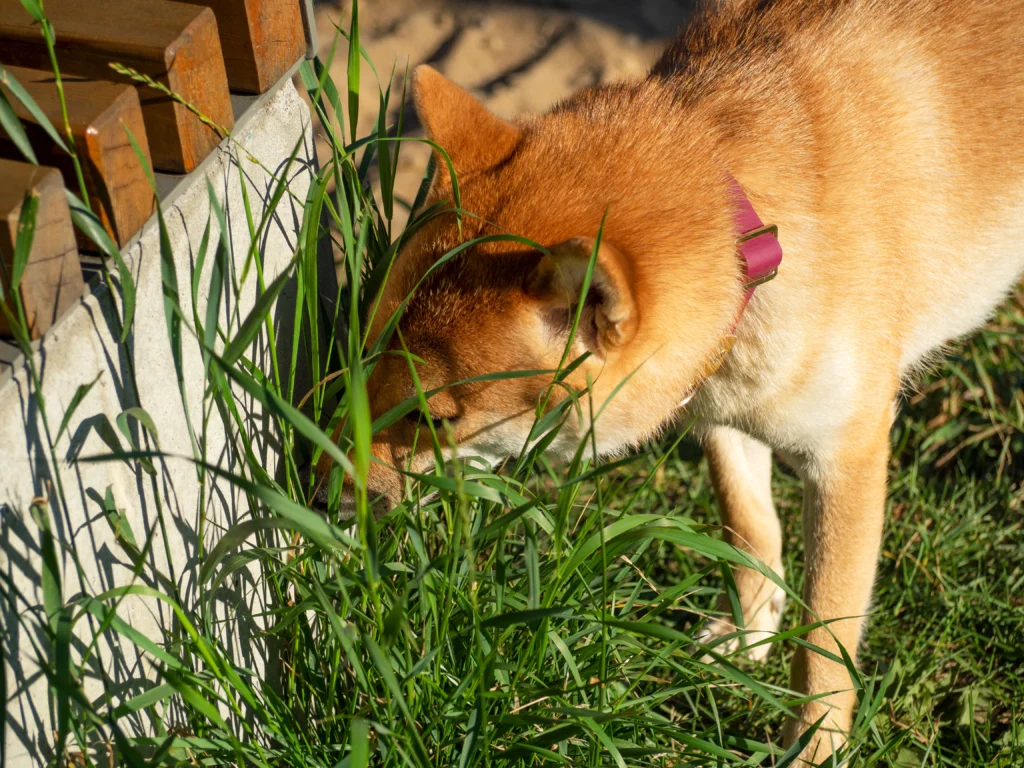
Preventive Measures for Healthy Grass-Eating Behavior
While addressing your current concerns about a dog eating grass frantically, implementing preventive measures can help maintain your pet’s overall health and potentially reduce problematic grass consumption:
Regular Veterinary Check-ups
dog suddenly eating grass like crazy
Schedule routine examinations even when your dog seems healthy. Early detection of issues can prevent them from progressing to the point where your dog eating grass and acting weird becomes a symptom.
Proper Diet and Nutrition
Feed a high-quality, balanced diet appropriate for your dog’s age, size, and activity level. Consider adding approved vegetables and fiber sources to their meals if your veterinarian agrees this might benefit your pet.
Learn more about selecting the right dog food for your pet’s specific needs.
Consistent Exercise Regimen
dog suddenly eating grass like crazy
Regular physical activity helps maintain digestive health and reduces the likelihood of your dog eating grass obsessively due to boredom or anxiety. Aim for at least 30 minutes of activity daily, adjusted for your dog’s age, breed, and health status.
Mental Stimulation
Provide plenty of toys, training sessions, and interactive games to keep your dog’s mind engaged. Mental stimulation is just as important as physical exercise for preventing behavioral issues like dog eating grass and restless symptoms.
Safe Outdoor Spaces
Ensure any grassy areas your dog has access to are free from:
- Pesticides and herbicides
- Toxic plants that might be confused with grass
- Fertilizers
- Parasite contamination
- dog suddenly eating grass like crazy
Understanding Normal vs. Problematic Grass Eating
To help you better distinguish normal grazing from concerning behavior, here’s a quick reference guide:
| Normal Grass Eating | Problematic Grass Eating |
|---|---|
| Occasional nibbling | Dog eating grass frantically |
| Brief interest during walks | Dog eating grass excessively for extended periods |
| No accompanying symptoms | Dog eating grass and vomiting or showing other symptoms |
| Calm demeanor while grazing | Dog eating grass and acting weird or seeming distressed |
| Normal appetite and digestion | Dog eating grass and not eating food or having digestive issues |
| Consistent behavior over time | Sudden change in dog behavior eating grass |
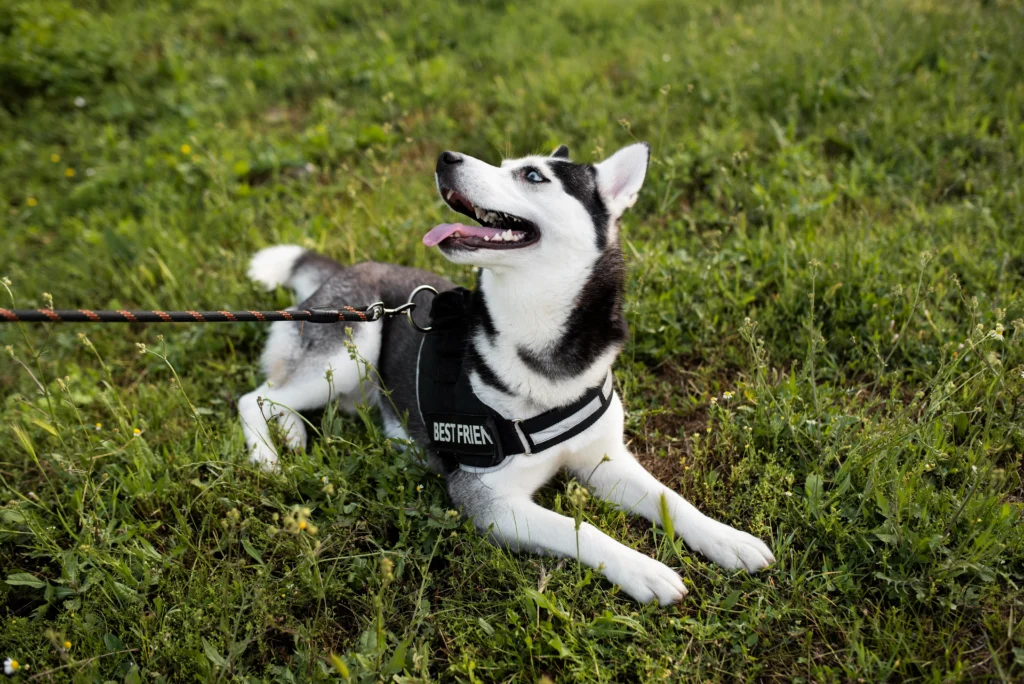
Conclusion
When your dog suddenly eating grass like crazy becomes a noticeable pattern, it deserves your attention. While occasional grass consumption is normal canine behavior, frantic or excessive eating often signals something more serious than simple curiosity or taste preference.
The five alarming reasons we’ve discussed—gastrointestinal distress, nutritional deficiencies, psychological factors, intestinal parasites, and underlying medical conditions—all require different approaches. By carefully observing your pet’s behavior and consulting with veterinary professionals when needed, you can ensure your dog receives appropriate care.
dog suddenly eating grass like crazy
Remember that what does it mean when dog eats grass varies based on the individual pet and circumstances. Your attentiveness to changes in your dog’s behavior is their first line of defense against potential health issues.
dog suddenly eating grass like crazy
- Understanding Common Dog Digestive Issues
- Signs Your Dog Might Be In Pain
- When to Consider Emergency Veterinary Care
Has your dog experienced unusual grass-eating behavior? What was the cause in your case? Share your experiences in the comments below to help other pet parents navigate this common concern.
dog suddenly eating grass like crazy
FAQs About Dogs Eating Grass
Why is my dog eating grass suddenly?
Your dog eating grass suddenly could be due to gastrointestinal discomfort, nutritional deficiencies, anxiety, boredom, intestinal parasites, or underlying medical conditions. The sudden onset suggests something has changed in your dog’s health or environment that deserves attention.
dog suddenly eating grass like crazy
Is it dangerous if my dog eats grass?
Occasional grass eating is usually not dangerous, but dog eating grass frantically or excessively could lead to problems, especially if the grass is treated with chemicals or if your dog is ingesting so much that it leads to intestinal blockage. Additionally, the behavior itself might be a symptom of a more serious issue.
dog suddenly eating grass like crazy
Should I stop my dog from eating grass?
If your dog eating grass and throwing up is occasional and they otherwise seem healthy, you probably don’t need to intervene. However, if the behavior is excessive, compulsive, or accompanied by other symptoms, you should consult your veterinarian and potentially limit access to grass while addressing the underlying cause.
dog suddenly eating grass like crazy
Can parasites cause my dog to eat grass?
Yes, intestinal parasites can cause digestive discomfort that might lead to your dog eating grass and vomiting or showing other symptoms. If you suspect parasites, have your veterinarian perform a fecal test and follow their recommended treatment plan.
dog suddenly eating grass like crazy
How can I tell if my dog’s grass eating is behavioral or medical?
Consider the context and accompanying signs. Dog eating grass anxiety often occurs during stressful situations and improves with exercise and mental stimulation. Medical causes typically involve additional symptoms like vomiting, diarrhea, weight loss, or lethargy, and the behavior tends to persist regardless of environmental factors.
When should I take my dog to the vet for eating grass?
Consult your veterinarian if you notice your dog suddenly eating grass like crazy along with any of these factors: the behavior is new and persistent, your dog is showing other symptoms of illness, the grass eating is frantic or obsessive, or your dog is vomiting frequently after eating grass.
Can changing my dog’s diet help with excessive grass eating?
If nutritional deficiencies are behind your dog eating grass excessively, dietary adjustments might help. Consult with your veterinarian about appropriate diet changes, which might include adding fiber, switching to a different formulation, or addressing food sensitivities.
Does grass eating indicate my dog is sick?
While dog eats grass when sick can be true in some cases, not all grass eating indicates illness. However, when combined with other symptoms or when the behavior is sudden and intense, it could suggest your dog is experiencing discomfort or illness that requires veterinary attention.
Can anxiety cause my dog to eat grass obsessively?
Yes, dog eating grass anxiety is a recognized phenomenon. Dogs experiencing stress, separation anxiety, or general nervousness might turn to grass eating as a coping mechanism or displacement behavior. Addressing the underlying anxiety through behavior modification, environmental management, and potentially medication (with veterinary guidance) can help reduce this behavior.
Is there a difference between casual grazing and problematic grass eating?
Definitely. Dog grass eating behavior exists on a spectrum. Casual, occasional nibbling without other symptoms is generally normal. Problematic grass eating involves intense focus on grass consumption, frantic or excessive eating, accompanying symptoms like vomiting or diarrhea, or a sudden change in established behavior patterns.
Washington State University College of Veterinary Medicine
University of Pennsylvania School of Veterinary Medicine
Disclaimer: This article is for informational purposes only and should not replace professional veterinary advice. If you’re concerned about your dog’s health or behavior, please consult with a qualified veterinarian.





